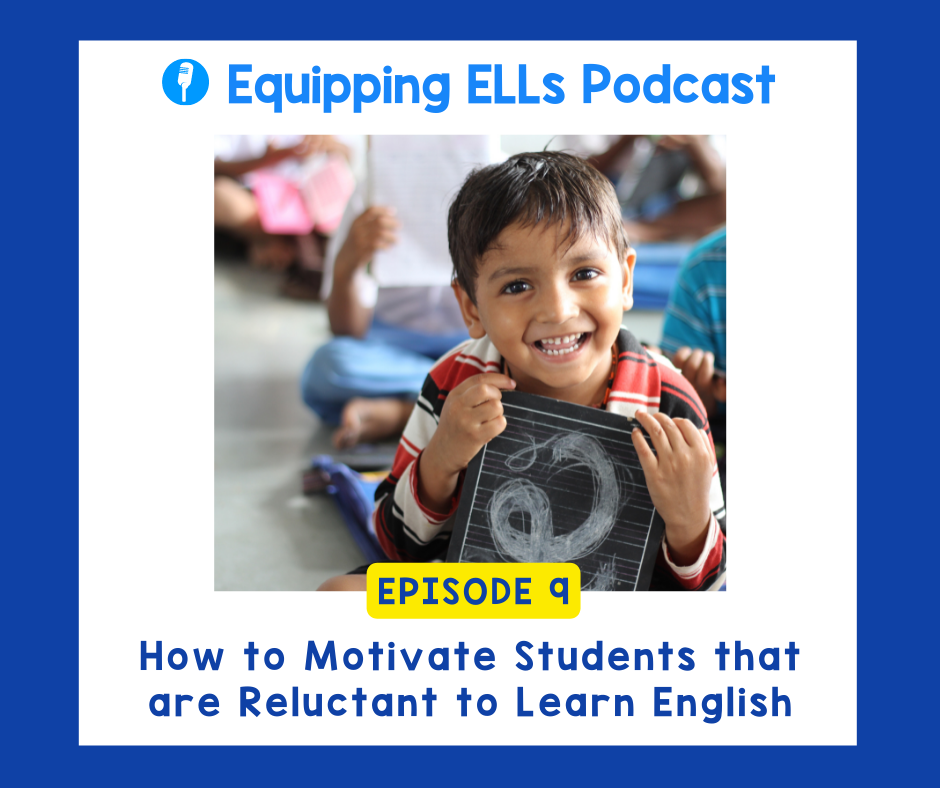Click below to hear how to motivate students that are reluctant to learn English:
What pops into your head when you hear the term “reluctant learners”? Finding a way to reach our reluctant learners can be a challenge, but unlocking the desire to learn in these students and helping them reach their full potential is incredibly rewarding and totally worth it.
In this episode, I’m sharing 3 different ways you can help your reluctant learners begin to learn English. If you have ELL students who just seem to have no desire to learn the language, you’re not alone. Many teachers are facing this challenge right now.
It’s crucial that before we jump in to trying to teach them the language, we try to understand where they’re coming from and what kind of trauma they may be processing and dealing with. Whether they are coming from war-torn countries or have fled oppression and poverty, our ELL students are making huge adjustments.
Learning English may not be their top priority, and that’s completely acceptable and appropriate. There are things we can do as teachers to unlock their desire to learn and create a safe, caring environment where they can thrive. We have an incredible and unique opportunity to instill in them the gift of being multilingual learners.
Topics discussed in this episode:
- Ways to help reluctant learners stay engaged and build a desire to learn English
- The importance of understanding what might be inhibiting our ELL students from learning
- Why we must unlock the desire to learn in our students before we even focus on the academic learning and how to unlock that desire
- What “Pobrecito Syndrome” is and how to avoid it in your classroom by setting clear and appropriate expectations for ELL students
- How to build a classroom environment that feels safe and encourages ELL students to speak in a fun way so students have plenty of opportunities to apply the language they’re learning
Related resources:
- Grab these FREE WIDA Can-Do Descriptors
- Grab the ESL Newcomers Bundle
- Join the Equipping ELLs Membership
- Check out the ELL Strategy Academy
- Shop TpT resources that help with supporting your ELLs
Related episodes and blog posts:
- Episode 3, How to Set Up Your Classroom to Welcome Newcomers
- Episode 7, From Newcomer to MLB Scout
- How to Shorten the Silent Period in Your ELL Students
- 10 Tips for Teachers That Are New to Teaching ELLs!
Connect with Beth:
- Join the Facebook group: Inspiring Young Learners Engage!
- Follow her on Instagram @inspiringyounglearners.
More about Equipping ELLs:
We all know that teaching isn’t easy, but it doesn’t have to be this hard. Equipping ELLs is a podcast for both ESL specialists and homeroom teachers who are looking for effective and engaging ways to support their English Language Learners without adding to their endless to-do list. Tune in each week to hear tips, strategies, and inspirational stories that will empower you to better reach your ELL students, equip them with life-long skills, and strengthen relationships with colleagues and parents.
Your host, Beth Vaucher, is the founder of Inspiring Young Learners. She is an ESL certified homeroom teacher with over 10 years of experience teaching in the US and internationally. Her background of M.Ed in ESL and Curriculum and Instruction combined with her experience has led her to develop a bestselling newcomer curriculum that has sold in over 90 countries around the globe. She brings a different perspective to teaching ELLs from her years teaching and living abroad and working with ELLs from around the world. You will walk away from each episode with the ideas and tools you need to transform your experience as a teacher and cultivate a thriving and welcoming environment for your ELL students.




One Comment
Thank you so much Beth for these inspiring blogs. I have shared one of your blogs with a long time EL teacher and friend. We had an in-service on Friday and my friend/colleague was our presenter. Time and time again she brought everything back to the asset/deficit way of thinking. For me this has been the hardest part of working within a building or multiple buildings. Too many times our EL’s that have made slow progress(reluctancy maybe) have been put in the IEP category as they come close to leaving our building and going on to a public school. I have had long term EL’s(past the 5-10 years English learner) that cannot pass the state test for English but are on track for graduation! An IEP is not an option if the child can and does have deep understanding of read alouds in heritage language and English and shows progress on English language assessments(OELPA, Words their Way(phonics), and writing. Nevertheless, what to do with that reluctant English learner as they are quickly approaching leaving our private school and going into a public school with no EL support there? I am very reluctant to put an language learner on an IEP unless strongly warranted. Thank for listening!